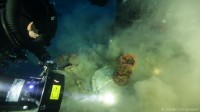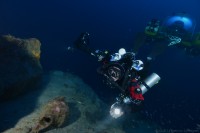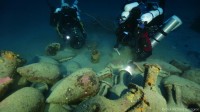 Divers have recovered an altar that was used for on-board sacrifices from a 2,200-year-old shipwreck off the Aeolian Island of Panarea just north of Sicily. Such altars have been found before on land and one was discovered in the shallow Adriatic waters around the Croatian island of Hvar, but this is the first one to be found on a shipwreck.
Divers have recovered an altar that was used for on-board sacrifices from a 2,200-year-old shipwreck off the Aeolian Island of Panarea just north of Sicily. Such altars have been found before on land and one was discovered in the shallow Adriatic waters around the Croatian island of Hvar, but this is the first one to be found on a shipwreck.
 The wreck was discovered in 2010 by researchers from Sicily’s Superintendent of the Sea Office using sonar and a remote operated submersible. The 50-foot ship, dubbed the Panarea III, and its cargo of amphorae were at a depth of 426 feet (130 meters), deep enough to keep it out reach of treasure hunters and naval traffic. The submersibles weren’t able to dive deeply enough to retrieve any objects from the wreck, so this year the Superintendent enlisted technical divers from the non-profit Global Underwater Explorers (GUE) to explore the site and recover a few artifacts. They also had the aid of two high tech submersibles with gripper arms.
The wreck was discovered in 2010 by researchers from Sicily’s Superintendent of the Sea Office using sonar and a remote operated submersible. The 50-foot ship, dubbed the Panarea III, and its cargo of amphorae were at a depth of 426 feet (130 meters), deep enough to keep it out reach of treasure hunters and naval traffic. The submersibles weren’t able to dive deeply enough to retrieve any objects from the wreck, so this year the Superintendent enlisted technical divers from the non-profit Global Underwater Explorers (GUE) to explore the site and recover a few artifacts. They also had the aid of two high tech submersibles with gripper arms.
 They found a well-preserved wooden portion of the ship’s keel and recovered 16 artifacts — amphorae, pottery vessels, fishing plates and the altar — from the wreck, all of them in excellent condition. Divers didn’t realize what the altar was when they first saw it on the edge of the amphora field. It looked like a little pillar initially. When they blew away some of the accumulated silt, they found the bottom of it was mostly buried. About a foot in diameter at the widest point and three inches high, that was actually the top of the altar, a basin used to burn incense in ritual offerings. The base of the pedestal was found next to it. There are metal supports embedded in the base, probably the remains of fasteners to keep it from going overboard at the first swell. It’s engraved with three Greek letters (ETH) and there’s a decorative wave relief around the edge of the basin.
They found a well-preserved wooden portion of the ship’s keel and recovered 16 artifacts — amphorae, pottery vessels, fishing plates and the altar — from the wreck, all of them in excellent condition. Divers didn’t realize what the altar was when they first saw it on the edge of the amphora field. It looked like a little pillar initially. When they blew away some of the accumulated silt, they found the bottom of it was mostly buried. About a foot in diameter at the widest point and three inches high, that was actually the top of the altar, a basin used to burn incense in ritual offerings. The base of the pedestal was found next to it. There are metal supports embedded in the base, probably the remains of fasteners to keep it from going overboard at the first swell. It’s engraved with three Greek letters (ETH) and there’s a decorative wave relief around the edge of the basin.
 Archaeologists dated the objects to between 218 and 210 B.C. Because the cargo was mostly Greco-Italic jars but with Punic amphorae in the bow of the ship, archaeologists believe it was a Greek trading vessel that traveled between Rome and Carthage, possibly supplying the fleet of Roman consul Marcus Claudius Marcellus who was commander of Sicily from 214 to 211 B.C. These were dangerous times to be a merchant in the Mediterranean. The crew of the Panarea III had eminently good reason to bolt an altar to the ship’s deck and make copious sacrifices to the gods.
Archaeologists dated the objects to between 218 and 210 B.C. Because the cargo was mostly Greco-Italic jars but with Punic amphorae in the bow of the ship, archaeologists believe it was a Greek trading vessel that traveled between Rome and Carthage, possibly supplying the fleet of Roman consul Marcus Claudius Marcellus who was commander of Sicily from 214 to 211 B.C. These were dangerous times to be a merchant in the Mediterranean. The crew of the Panarea III had eminently good reason to bolt an altar to the ship’s deck and make copious sacrifices to the gods.
 The Second Punic War started in 218 B.C. and while the most famous military encounters between Carthage and the Roman Republic involved elephants, alps, the Fabian strategy and pitched battles with body counts so disastrously high to this day they are ranked as among the most costly battles in human history, Carthage and Rome threw fleets of ships at each other too. Rome was rather more successful on water than they were on land in the first eight years, winning major naval encounters around Sicily and Sardinia.
The Second Punic War started in 218 B.C. and while the most famous military encounters between Carthage and the Roman Republic involved elephants, alps, the Fabian strategy and pitched battles with body counts so disastrously high to this day they are ranked as among the most costly battles in human history, Carthage and Rome threw fleets of ships at each other too. Rome was rather more successful on water than they were on land in the first eight years, winning major naval encounters around Sicily and Sardinia.
 Marcellus was successful on land as well, particularly when given command of Sicily. He besieged the city of Syracuse, then allied to Carthage and a powerful potential foothold for Hannibal in his struggle to conquer Italy, for two years (214 B.C. – 212 B.C.) by sea and by land. It took so long to take the city because it was ably defended by high walls and the ingenious inventions of Archimedes. After the Romans finally found a weak point in the wall and broke through, a soldier came upon Archimedes in his study and killed him despite Marcellus’ order that the great mathematician not be harmed.
Marcellus was successful on land as well, particularly when given command of Sicily. He besieged the city of Syracuse, then allied to Carthage and a powerful potential foothold for Hannibal in his struggle to conquer Italy, for two years (214 B.C. – 212 B.C.) by sea and by land. It took so long to take the city because it was ably defended by high walls and the ingenious inventions of Archimedes. After the Romans finally found a weak point in the wall and broke through, a soldier came upon Archimedes in his study and killed him despite Marcellus’ order that the great mathematician not be harmed.
The artifacts recovered from the shipwreck will be conserved and eventually put on display at the Aeolian Archaeological Museum of Lipari
Why are these letters necessarily Greek, and not Roman – or even Punic ? Do the experts have ideas about what ‘ETH’ could stand for ?
Ok, in two millenia from now, experts might wonder, what the heck ‘GUE’ could have been, and why we put it onto our weird sort of ‘amphorae’.
Here, a selection of greek words with ‘ETH’ (or ‘ἐτη’, in lower case):
——————
ἐτήρ one year old
ἐτησίαι periodic winds
ἔτης clansmen
ἐτητυμία truth